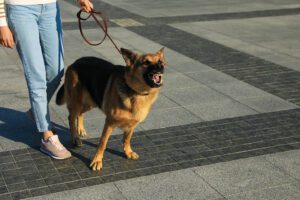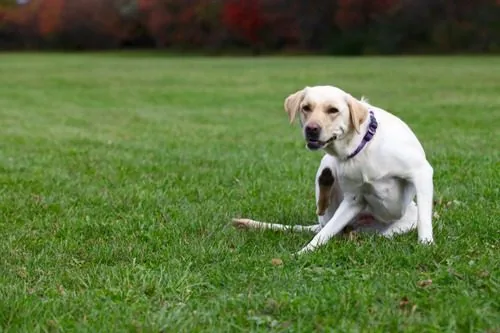How to Handle Aggression in Dogs
A Comprehensive Guide on How to Handle Aggression in Dogs
If you’re a pet owner dealing with aggression in your dog, it’s crucial to address the issue promptly and effectively. Aggression in dogs can be a complex behavior problem that requires patience, understanding, and proper handling techniques. In this comprehensive guide, we will discuss the common types of aggression in dogs, how to identify aggression triggers, and effective strategies to manage and prevent aggression in your beloved canine companion.

Understanding Aggression in Dogs
Aggression in dogs can manifest in various ways, and it’s essential to recognize the different types to address the issue properly. The most common types of aggression in dogs include:
- Fear Aggression: Dogs exhibiting fear aggression act aggressively when they feel threatened or scared. This type of aggression often stems from past traumatic experiences or lack of socialization.
- Territorial Aggression: Dogs with territorial aggression are highly protective of their living space and may display aggressive behavior towards unfamiliar humans or animals that enter their territory.
- Possessive Aggression: Dogs showing possessive aggression become aggressive when they perceive a threat to their resources, such as food, toys, or even their owners’ attention.
- Social Aggression: Dogs displaying social aggression may act aggressively towards other dogs or humans during interactions, often due to a lack of proper socialization or dominance issues.
Identifying Aggression Triggers
To effectively handle aggression in dogs, it’s crucial to identify the triggers that provoke aggressive behavior. Pay close attention to situations, objects, or actions that cause your dog to become aggressive.
Common triggers include:
- Fearful stimuli: Loud noises, unfamiliar people or animals, or certain objects can trigger fear aggression in dogs.
- Resource guarding: Dogs with possessive aggression may display aggression when someone approaches their food, toys, or other valuable possessions.
- Lack of socialization: Inadequate exposure to different people, animals, and environments during a dog’s early development stages can lead to social aggression.
- Stressful situations: Dogs may become aggressive when faced with stressful situations, such as overcrowded spaces, rough handling, or being restrained.
Managing Aggression in Dogs
Creating a Safe Environment
Providing a safe environment for your dog is crucial when dealing with aggression. Implement the following measures:
- Secure your home: Ensure your dog cannot escape the premises and that there are no easily accessible triggers, such as open windows or gaps in the fence.
- Use a muzzle: If your dog’s aggression poses a risk to others or their safety, consult a professional and consider using a muzzle for temporary control during training.
Positive Reinforcement Training
Positive reinforcement training is an effective method to manage aggression in dogs. Use these techniques:
- Reward good behavior: Whenever your dog displays calm and non-aggressive behavior, reward them with praise, treats, or toys. This helps reinforce positive behaviors and redirects their focus away from aggression.
- Redirect attention: Teach your dog alternative behaviors, such as sitting or lying down, to redirect their attention when they show signs of aggression.
Seeking Professional Help
Dealing with aggression in dogs can be challenging, and seeking professional help is highly recommended. A veterinarian or a professional dog trainer with experience in behavior modification can provide invaluable guidance and develop a customized training plan for your dog’s specific needs. Remember to reach out to The Village Vets in Georgia for expert assistance.
Preventing Aggression in Dogs
Prevention is always better than cure when it comes to aggression in dogs. Follow these preventive measures:
Socialization and Obedience Training
Proper socialization from an early age is essential to prevent aggression. Expose your dog to different environments, people, and animals, ensuring positive interactions. Obedience training also establishes a foundation of discipline and respect.
Proper Exercise and Mental Stimulation
Regular exercise and mental stimulation are vital to keep your dog physically and mentally balanced. Engage them in activities such as daily walks, interactive play, and puzzle toys to prevent pent-up energy and frustration that can contribute to aggression.
Consistency and Structure in Daily Routine
Dogs thrive in environments with consistency and structure. Establish a predictable routine for feeding, exercise, and rest, as it helps create a sense of security and reduces anxiety or stress that may trigger aggressive behavior.
Handling aggression in dogs requires understanding, patience, and appropriate training techniques. Remember to identify the type of aggression your dog displays, recognize the triggers, and create a safe environment. Implement positive reinforcement training methods, seek professional help if needed, and focus on prevention through socialization, obedience training, regular exercise, and a consistent routine. By addressing aggression promptly and effectively, you can ensure a happier, healthier, and more harmonious relationship with your furry companion.
Book an appointment at The Village Vets in Georgia today for expert advice and assistance in handling aggression in dogs. Visit www.thevillagevets.com to schedule your appointment and learn more about our veterinary services.
Recent Posts
About The Village Vets
The Village Vets is a network of animal hospitals based in Atlanta, GA and the surrounding area. We offer honest, excellent service to our clients in a comfortable, friendly atmosphere. To learn more about our locations and how we can better serve you and your pet, click the button below.
Share This Post
Recent Posts
About The Village Vets
The Village Vets is a network of animal hospitals based in Atlanta, GA and the surrounding area. We offer honest, excellent service to our clients in a comfortable, friendly atmosphere. To learn more about our locations and how we can better serve you and your pet, click the button below.



